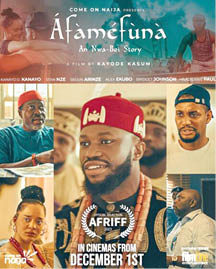- Title: Afamefuna
- Director: Kayode Kasum
- Year: 2023
- Running time: 2hrs
In Kayode Kasum’s second offering of the year, Afamefuna, we are presented with a cinematic experience that not only deserves acclaim but could even invoke the divine approval of a Biblical fire. Firmly rooted in the contemporary, it echoes the timeless narrative of Cain and Abel. Instead of blood ties, we traverse the intricate dynamics of the “nwa bois,” apprentices to wealthy Igbo businessmen, under the Igbo Apprenticeship System. As the narrative unfolds, we witness the complexities of sacrifice, betrayal, and the camaraderie that binds these guys together.
Afamefuna Okoli and Paul Obiajulu, both apprentices under the tutelage of the affluent businessman Odogwu (Kanayo O. Kanayo), become central figures in this tale. Their relationship evolves beyond a mere mentor-apprentice dynamic, forging a brotherhood that takes an unexpected turn with the introduction of love, embodied by Odogwu’s daughter, Amaka. The big crime question of the film is produced by these three central characters: Afamefuna, Paul and Amaka. The film opens with a dual setting – Afamefuna’s opulent memorial for his deceased father and the grim discovery of Paul’s lifeless body, setting the stage for a crime investigation led by Inspector Shehau (Segun Arinze). The rest of the film unfolds through the titular character’s recollections within an interrogation room.
Stan Nze and Atlanta Bridget Johnson (who play adult lovebirds of Afamefuna and Amaka, respectively) delivers performances that intertwine seamlessly, weaving together intricate threads of their characters’ perspectives. In Bridget Johnson’s remarkable performance, which embodies a certain vulnerability, we see Amaka’s naivety and occasional hopefulness, evoking empathy through her tears that feel so genuine that you feel for her character. Even more impressively, all the actors shine in Afamefuna with great chemistry, but Alex Ekubo emerges as the star of the film. His portrayal of adult Paul, characterised by sweetness, friendship, trickery, and blackmail, compensates for any potential lapses in the performances of other actors. Odogwu, played by Kanayo O. Kanayo, stands out as well. His measured portrayal avoids the pitfalls of stereotyping, and thankfully, his character breaks away from the money-hungry character he is known to play.
Afamefuna, opting for a tinge of crime, transcends its role as a mere cinematic creation; it emerges as a cultural exploration akin to films like Lionheart (2018), the family drama; and Jagun Jagun (2023), the warrior epic. The predominant use of the Igbo language, dialogue interspersed with witty sayings and proverbs, contribute to the film’s cultural awareness. This linguistic richness not only serves the narrative but also positions the film as a potential contender on the global stage.
- Over 1,500 Kaduna schools lack fence – Gov Sani
- Naira could trade below N1,000/$, Goldman Sachs predicts
Visually, Afamefuna is stunning, as it bursts with vibrant colours and polished camera work. The film uses a brown-orange colour scheme and open, well-lit spaces to convey warmth. When there is a conflict between Paul and Afamefuna, there is a cold air about the lighting, and we are fed with close-up shots of a threatening Paul and a defeated Afamefuna. There is the sense of Afamefuna’s eyes as the watching camera, and when a transition from boyhood to adulthood occurs, it still occurs with a smooth transition from his perspective. Thankfully, we are not inundated with cultural music to prove the homage to Igbo culture, as done in past films of similar explorations. Instead, there is a judicious use of Ogene or highlife-pop music interspersed in certain scenes. Kasum’s growth as a director is evident, surpassing the shortfalls of his previous works, such as Obara’m and Sugar Rush.
While the film occasionally adopts a documentary-like tone due to its expository nature, it is undeniably an homage, not only to the Igbo culture but also to their remarkable business acumen and the resilience of the tribe, particularly after the Nigeria-Biafra war. The film generously unfolds the layers of the Igbo Apprenticeship System, providing a profound understanding of its intricacies.
Written by Anyanwu Sandra Adaora, the film’s ambitious storytelling takes on multiple subjects simultaneously, and while it occasionally feels like a documentary, it skillfully weaves various threads, resolving most by the end. Yet, an ongoing uncertainty shrouds Paul Obiajulu’s entitlement and the compulsion felt by Afamefuna to comply with his whims. Only after a significant paternity revelation is hinted at do we receive substantial explanations.
Despite these uncertainties, Afamefuna offers a pleasurable sensory experience, maintaining the integrity of its culturally rich essence. You might exit the film with lingering questions about some characters’ motivations, yet the desire for answers doesn’t persist; the overall enjoyment leaves you satisfied. Kasum sets a higher bar with this creation, leaving audiences eager for his future endeavours.
www.whatkeptmeup.com

 Join Daily Trust WhatsApp Community For Quick Access To News and Happenings Around You.
Join Daily Trust WhatsApp Community For Quick Access To News and Happenings Around You.


